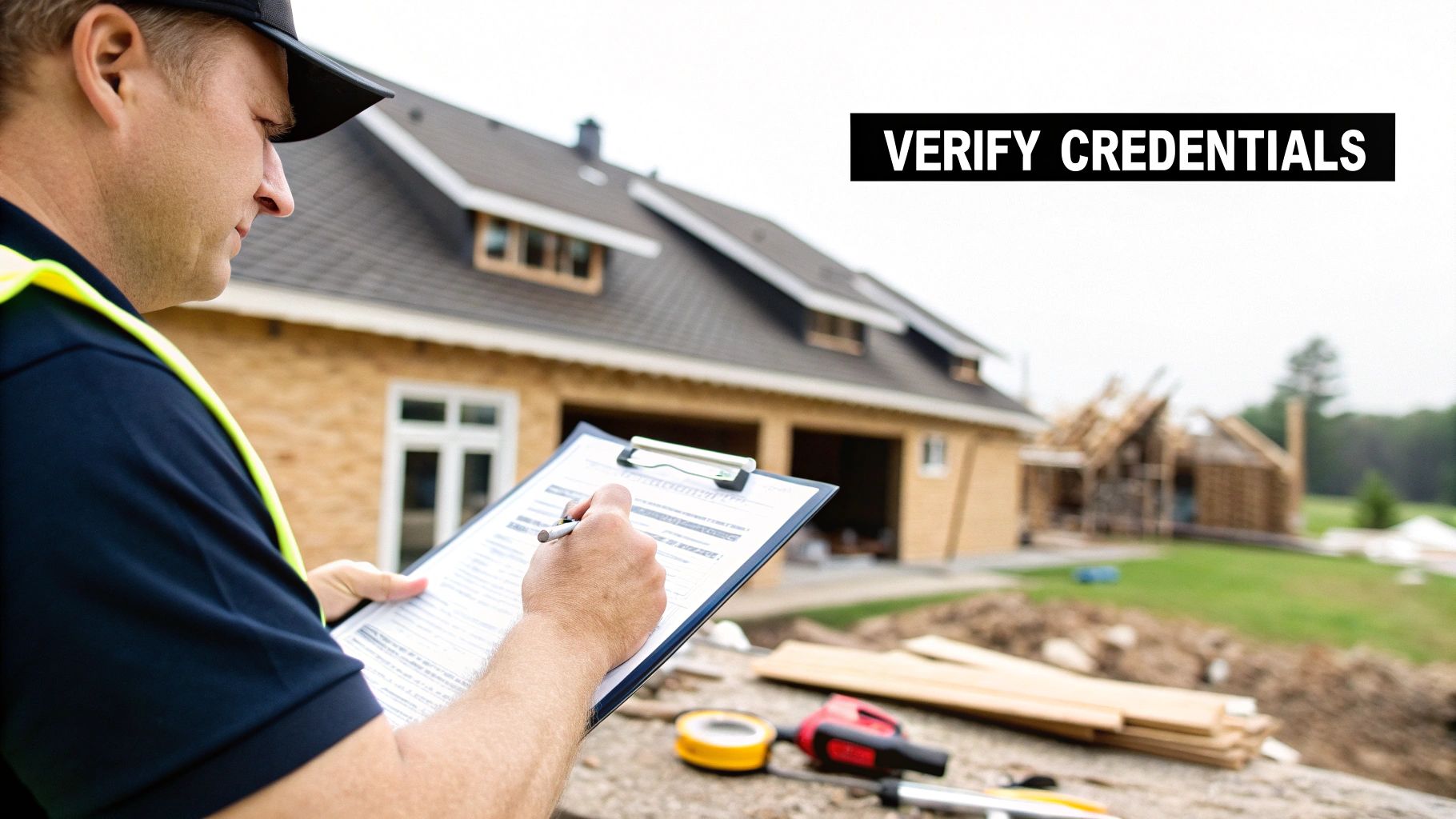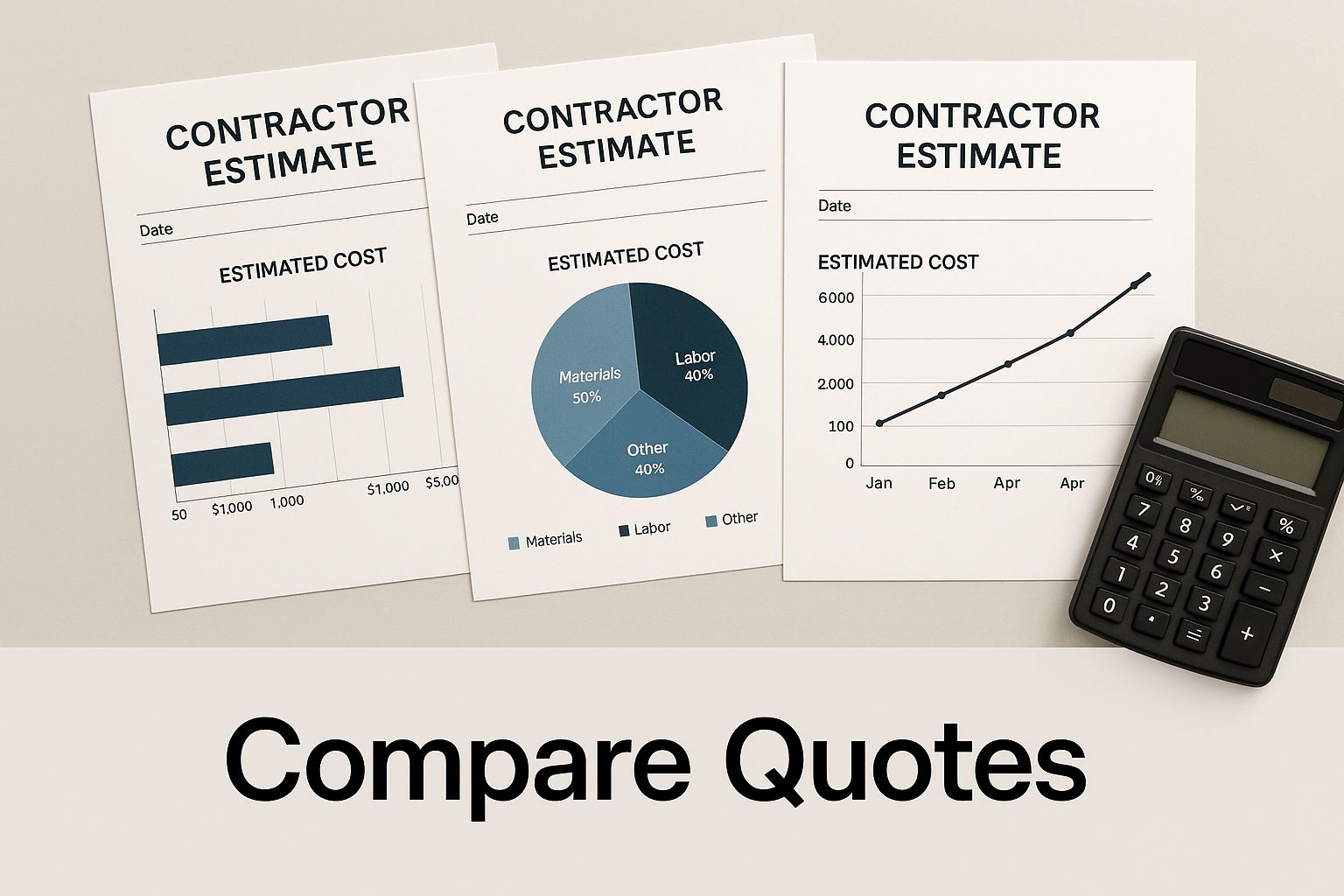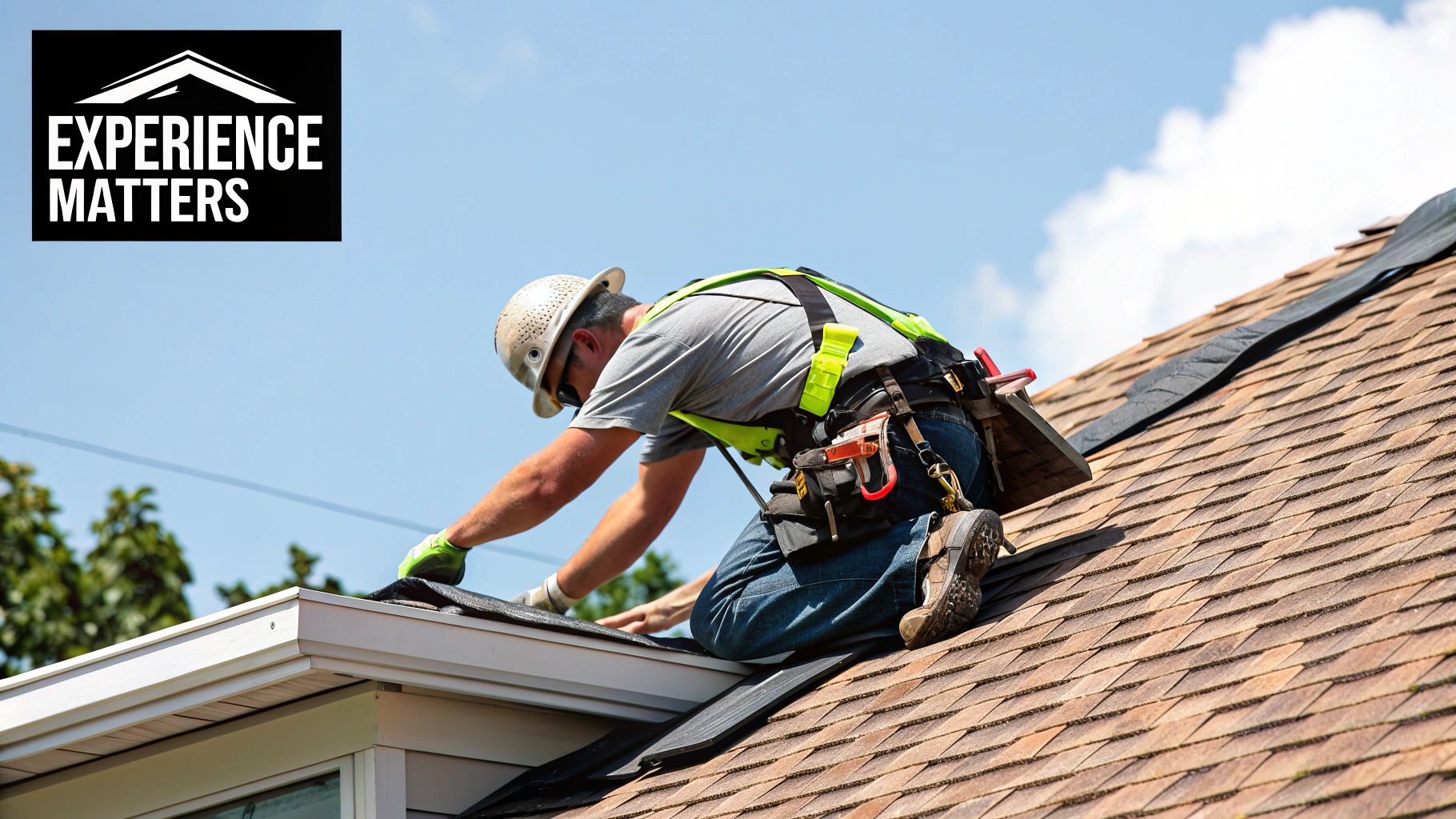Choosing a roofing contractor is a critical decision to safeguard your home against severe weather and daily wear. A poor choice can lead to costly repairs and endless frustration. This guide provides actionable steps to help you hire a qualified professional.
To make the right choice, you must verify their state license, confirm they have both general liability and worker’s compensation insurance, and check for real, proven experience with local building codes. These are not suggestions—they are your first line of defense against incompetent work.
Your Essential Roofer Vetting Checklist
Hiring a roofer involves more than just finding someone to nail on shingles; it requires finding a partner who understands your local climate and building regulations.
The following steps act as a pre-qualification process. The goal is to eliminate unqualified, uninsured, and unreliable operators before they can give you a quote. This proactive approach saves you time and prevents potential disaster.
Start With The Absolute Non-Negotiables
Before you review estimates, take these initial screening steps. Any legitimate roofer will have this information readily available. If a contractor hesitates to provide these credentials, consider it a major red flag and move on.
Here’s your initial filter:
- A Valid State License: Check that the contractor holds a current state license. This proves they have met the minimum competency requirements for your area. Don’t take their word for it—verify it through your state’s licensing board website.
- Comprehensive Insurance: Ask for a Certificate of Insurance (COI) showing proof of both general liability (to cover damage to your property) and worker’s compensation (to cover injuries to their crew). Without both, you could be liable for accidents.
- A Local, Physical Address: Look for a company with a verifiable local office. A physical presence indicates they are an established part of the community, not a “storm chaser” who will disappear after the job is done, voiding your warranty.
Contractor Vetting Quick Reference
Use this table as a quick-reference tool to systematically vet any potential roofing contractor.
| Vetting Criteria | Why It’s Critical in South Florida | Actionable Step |
|---|---|---|
| State Licensing | Florida has strict licensing to ensure contractors know hurricane-rated standards. | Ask for their license number and verify it on the DBPR website. |
| Full Insurance Coverage | Protects you from liability for on-site accidents or property damage during storms. | Request a Certificate of Insurance (COI) for both liability and worker’s comp. |
| Local Physical Office | Confirms they are an established local business, not a post-storm opportunist. | Look up their address on Google Maps to ensure it’s a real, commercial location. |
| Local Experience | They must understand the nuances of the High-Velocity Hurricane Zone (HVHZ) codes. | Ask for addresses of recent, local projects you can drive by. |
This table isn’t just a list; it’s a a strategic framework. Following these steps is the most effective way to ensure you hire a legitimate professional who will stand by their work.
The roofing industry, especially here in Florida, is booming due to the rise in extreme weather. This high demand unfortunately attracts some less-than-reputable players, making it more critical than ever to do your homework.
While this guide focuses on roofing, the core principles of due diligence are universal for any major home project. It’s always smart to spend time understanding the nuances of choosing the right contractor, no matter the trade.
Verifying Credentials Beyond the License Number

A state license is just the starting point. It confirms basic compliance but reveals nothing about a contractor’s professionalism or ability to protect you from liability. To find a trustworthy roofer, you must dig deeper into their insurance coverage.
When a contractor provides a Certificate of Insurance (COI), your next step is to call the insurance agency listed on the document. Your goal is to confirm that two specific policies are active and provide adequate coverage for your project.
The Two Pillars of Contractor Insurance
First is General Liability. This policy protects your property. If a ladder falls and breaks a window or shingles damage your car, their general liability insurance covers the repair costs, preventing a claim against your homeowner’s policy.
Second is Worker’s Compensation, which is even more critical. Roofing is a hazardous profession with a fatality rate nearly double the construction industry average. If a worker is injured on your property and the contractor lacks worker’s comp, you could be sued for their medical bills and lost wages.
ACTIONABLE TIP: Beware of contractors who claim their crew are “1099 subcontractors” to avoid paying for worker’s compensation. This tactic transfers the financial and legal risk directly to you. Never hire a contractor who uses this excuse.
What to Ask the Insurance Agency
When you call the insurance provider, ask pointed questions to get the necessary information:
- “Does this policy specifically cover roofing operations?”
- “What are the coverage limits for the general liability policy?”
- “Can you confirm that the worker’s compensation policy is current and has not lapsed?”
Taking these verification steps is what transforms a simple background check into true due diligence. It ensures the roofer you hire is a legitimate professional who has taken the necessary steps to protect you, your property, and their own employees. To see how these details can influence your project, you can learn more about finding the right tools for the job, like with a quality.
How To Analyze Estimates And Spot Red Flags
Receiving roofing quotes is simple; interpreting them correctly is the real work. A professional estimate is more than a price—it’s a detailed scope of work that protects both you and the contractor. Your objective is to select a roofer based on total value, not just the lowest price.
An unusually low bid is an immediate red flag. It signifies that the contractor is cutting corners on materials, labor, or crucial installation steps like underlayment and flashing. These shortcuts will inevitably lead to costly future repairs.
Decoding The Details Of A Quote
Avoid any vague, one-page estimate. Its ambiguity is designed to allow for surprise charges later. A trustworthy quote is itemized, providing a transparent breakdown of every cost. This document becomes your project’s roadmap. To see what a properly protected and finished home looks like, you can view examples of professionally completed roofing projects.
Insist that any estimate you consider includes these specific line items:
- Material Breakdown: The quote must specify the brand, type, and color of all materials, including shingles, underlayment, and flashing.
- Labor Costs: This should be clearly defined, covering both the tear-off of the old roof and the complete installation of the new one.
- Waste Disposal: The proposal must detail the costs for a dumpster and the removal of all project-related debris.
- Permit Fees: It should clearly state who is responsible for pulling permits and specify the associated fees.

Arranging estimates side-by-side allows you to easily compare specifications and identify where a contractor may be using inferior materials or underestimating labor.
Comparing Roofing Bids: What To Look For
Use this table to perform a side-by-side comparison of your quotes. This will help you distinguish a professional proposal from a risky one.
| Quote Component | Good Sign (Green Flag) | Warning Sign (Red Flag) |
|---|---|---|
| Overall Detail | Itemized list of all materials and labor. | Vague, one-page summary with a single price. |
| Materials | Specifies brands, types (e.g., GAF Timberline HDZ), and colors. | Uses generic terms like “shingles” or “underlayment.” |
| Labor | Clearly outlines scope: tear-off, installation, cleanup. | Lumps labor into a single, unexplained cost. |
| Contingencies | Includes a clause for handling unexpected issues like rotted decking. | No mention of how unforeseen problems will be handled. |
| Permits & Disposal | Explicitly includes costs for permits and dumpster/debris removal. | These costs are missing or marked as “homeowner’s responsibility.” |
| Payment Schedule | Small down payment (10-20%), with final payment upon completion. | Demands a large upfront deposit (50% or more). |
| Insurance | Proof of liability and workers’ comp is attached or readily offered. | Reluctant to provide insurance certificates; vague answers. |
A detailed quote demonstrates a contractor’s professionalism and experience. It shows they understand the true scope of the project and are transparent about it.
Key Takeaway: Never accept a verbal agreement. If a contractor will not put every detail in writing, it’s a clear sign they do not intend to be bound by their promises. Refuse to work with them.
Finally, reject any high-pressure sales tactics. Phrases like, “This price is only good if you sign today,” are designed to rush your decision. A reputable professional will provide their proposal and give you adequate time to review it.
Assessing True Local Experience and Reputation
When evaluating a roofer, “experience” means more than just years in business. It signifies a deep, practical understanding of your region’s specific climate challenges and building codes.
A true local expert understands hurricane codes, high-velocity wind zones, and how to efficiently navigate local permit offices. This specialized knowledge separates career roofers from “storm chasers,” who arrive after a major weather event, perform substandard work, and disappear before you discover the problems.
To identify a legitimate local pro, ask for references and then ask specific, probing questions.
Questions That Reveal Real-World Performance
When speaking with a past client, ask questions that reveal how the company performs under pressure. A contractor’s character is most evident when unexpected issues arise.
Ask these direct questions:
- Cleanup and Professionalism: “How did the crew manage daily cleanup? Was your property kept tidy and safe throughout the project?”
- Communication: “How did the contractor communicate unexpected issues, such as rotted decking? Were you informed promptly and involved in the solution?”
- Timeline Adherence: “Did the project finish on schedule? If there were delays, did they provide clear explanations?”
A contractor’s reputation isn’t just built on a beautiful finished roof. It’s built on how they manage every single step to get there. Look for consistency, clear communication, and respect for your property. Those are the signs of a company that’s here to stay.
The Supplier and Building Department Test
Here is a pro tip for vetting a contractor: check their reputation with other industry professionals.
Ask the contractor for the names of their primary material suppliers. Call the supply house and ask if the roofer maintains a good account and pays their bills on time. Reputable suppliers avoid extending credit to unreliable contractors, making this a powerful indicator.
In the U.S. residential roofing market, an overwhelming 92% of homeowners say their roof is a top home improvement priority. With demand this high, you have to be picky to ensure you get a contractor who can deliver quality service without long delays. You can find more roofing industry statistics from RoofLink that show how market trends can affect your project.
Decoding Contracts and Roofing Warranties

After selecting a contractor, you must scrutinize the paperwork. The contract transforms promises into legally binding commitments, and it is imperative that you review it thoroughly before signing.
A handshake deal is worthless. A detailed, written contract is your only true protection. It serves as the official rulebook for the project, eliminating ambiguity and defining expectations for both parties.
Must-Have Clauses In Your Roofing Contract
A vague contract is a major red flag. A professional agreement is filled with specific details. If you do not see the following items clearly defined, insist they be added before you sign.
Your contract must include:
- A Detailed Scope of Work: A complete description of all tasks, from tear-off to final cleanup.
- Specified Materials: The contract must list the exact brand, model, and color of all components.
- A Clear Payment Schedule: The contract must state precisely when payments are due. A standard structure is a 10-20% deposit, with the final payment due only after the project is 100% complete.
- Defined Timelines: The contract must include a projected start date and a reasonable completion date.
Never sign a contract that feels rushed or has blank spaces. A true professional will review every clause with you and ensure you are comfortable. Their willingness to do so is a strong indicator of their integrity.
Understanding Your Warranty Protection
The contract protects you during the project; warranties protect you for years afterward. You will receive two distinct warranties. It helps to see examples of what a professional warranty document looks like to know what to expect.
First is the manufacturer’s warranty, which covers defects in the roofing materials themselves.
The second, and more important, is the contractor’s workmanship warranty. This is the roofer’s guarantee on their installation quality. Even the best materials will fail if installed improperly. This warranty protects you from leaks and other issues caused by installer error. Verify its duration (typically two to ten years) and ensure it covers both labor and materials for any necessary repairs.
Answering Your Final Questions Before You Hire
Even after thorough research, you may still have questions. This is a positive sign that you are taking this significant investment seriously.
Let’s address the most common final questions homeowners have before signing a contract. Clarifying these last points will help you hire with confidence.
How Many Quotes Do I Really Need to Get?
The old “get three quotes” rule is outdated. Quality is more important than quantity.
It is far more effective to get two highly detailed estimates from fully vetted companies than five vague bids from unvetted roofers. Once you have confirmed licenses, insurance, and local experience, focus your energy on comparing your top two or three candidates. Do not waste time collecting more quotes simply to meet an arbitrary number.
What if the Best Roofer Isn’t the Cheapest?
The best roofer is almost never the cheapest. An exceptionally low price is a clear warning that critical elements are being compromised, whether it’s material quality, insurance, labor experience, or the warranty.
View your roof as a long-term investment in your home’s safety and value. Choosing the lowest bid often results in more expensive repairs later. Your goal should be to find the best overall value, not the lowest price.
The most expensive roof is the one you have to pay for twice. A slightly higher upfront cost for a quality installation from a reputable company is one of the smartest investments a homeowner can make.
Is It a Red Flag if a Roofer Uses Subcontractors?
This is a nuanced issue. Many established roofing companies use trusted subcontracting crews. The practice itself is not a red flag, but a lack of transparency is.
A professional contractor will be open about their use of subcontractors. The critical action for you is to verify that the subcontractors are fully covered under the primary contractor’s worker’s compensation and general liability insurance. If the contractor becomes defensive or cannot provide proof of this coverage, it is a major red flag, and you should walk away.
How Long Should My Roofing Project Actually Take?
Project timelines vary based on several factors:
- Size and Complexity: A simple ranch home roof is faster to complete than a multi-level roof with a steep pitch and complex angles.
- The Weather: Inclement weather can cause unavoidable and necessary safety delays.
- Materials: Asphalt shingles are generally faster to install than tile or metal roofing.
- Unforeseen Damage: Discovering rotted decking during tear-off will require replacement, adding time to the project.
A reliable roofer will provide a realistic timeline in the contract (e.g., 3-5 days for an average shingle roof) and will communicate clearly about any unexpected delays.
When you’re ready to protect your home with a roof built to withstand the South Florida climate, trust the experts at Exact Roofing. We provide detailed estimates, transparent communication, and expert installation backed by solid warranties. Get your free, no-obligation quote today and see the difference professionalism makes. Learn more about our services.

